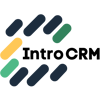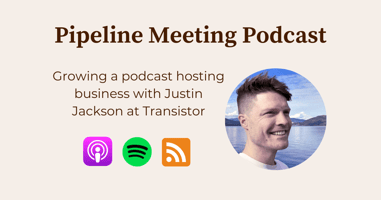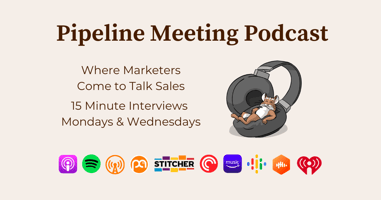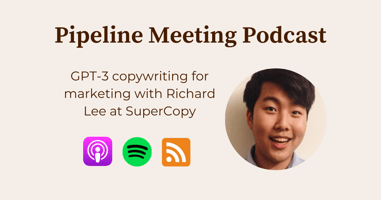Justin Jackson is the co-founder of Transistor.fm, the podcast hosting company that hosts this...
How to grow your podcast with Justin Jackson at Transistor
Justin Jackson, the co-founder of Transistor, joins for part two of a two-part interview series on podcasting. In this episode, he discusses how to grow your podcast.
Show Description
Where B2B marketers come to talk sales. 15-minute interviews published every Monday and Wednesday morning. For heads of marketing and founders who support a sales team.
Subscribe
Popular Platforms
Apple Podcasts
Spotify
RSS Feed
Also available:
Amazon • Anghami • Castbox • Castro • Deezer • GoodPods • Google Podcasts • iHeart Radio • Overcast • Pandora • PlayerFM • Pocket Casts • Podcast Index • Podchaser • Stitcher • TuneIn
Show Notes
Justin Jackson is the co-founder of Transistor.fm, the podcast hosting company that hosts this podcast. In part two of our interview series, Justin talks about how to grow a podcast audience.
His comments about creators, distribution, and arbitrage opportunities exceed well beyond podcasting itself, but if growing your podcast is your goal, then you're in the right place.
Justin has successfully grown his podcasting company, his own podcasts, and he's built a platform where major creators have succeeded in distributing their show to every major platform.
Find Justin Jackson on LinkedIn: https://www.linkedin.com/in/justinijackson/
Learn more about Transistor: https://transistor.fm/
Transcript
[00:00:00] Pipeline Meeting Intro
[00:00:00] Harris Kenny: Welcome to Pipeline Meeting where marketers come to talk about sales. I'm your host Harris, Kenny, and I'll be joined by guest every Monday and Wednesday for brief 15 minute interviews where we'll share tips that you can apply to support your sales team and help them close more deals.
[00:00:15] Harris Kenny: If you don't have time to listen to this whole episode, you can skip ahead in the show notes in your podcast player, or find the transcript at introcrm.com/podcast. All the episodes are published there.
[00:00:28] Introduction
[00:00:28] Harris Kenny: Before we get started, welcome back to part two of a two-part series with Justin Jackson, the co-founder of transistor.fm.
[00:00:36] Harris Kenny: In the first episode, Justin talked about podcasting itself, how it works, the underlying technology and the industry.
[00:00:43] Harris Kenny: In this episode, I continue my conversation with Justin and we talk about growing a podcast audience. And I'll just say that there are some fundamental lessons in here that apply to growing any kind of audience. Whether it's an email newsletter, a blog or any other form of content, particularly if you're thinking about doing inbound marketing.
[00:01:01] Harris Kenny: If you haven't heard the first episode, I'd encourage you to hit pause, go back and listen to that, then come back and finish this one.
[00:01:08] Harris Kenny: Let's get back into it.
[00:01:09] Podcast distribution
[00:01:09] Harris Kenny: how do you think about when people are thinking about growing their podcast? I've read the podcast about the woman who encouraged people to walk a mile
[00:01:20] Justin Jackson: Mm-hmm. Yep.
[00:01:21] Harris Kenny: growth on Apple
[00:01:22] Justin Jackson: The case study, yeah.
[00:01:23] Harris Kenny: Yeah. And then really kicked off on Spotify. And so it is a little bit more complicated if you're trying to get in front of people to navigate the different platforms.
[00:01:31] Harris Kenny: It seems like different platforms have different recommendation engines. It would be in theory easier if there was one player and you just pay them to put your podcast in front of people instead. It, it does seem like you have to do a lot more thinking.
[00:01:43] Justin Jackson: Every single time there's been centralization, creators suffer. So as soon as most streaming music was going through Spotify, initially everybody was stoked. it's like we get all this distribution, everybody's using Spotify.
[00:01:57] Justin Jackson: So theoretically if Justin Jackson uploads a rap song to Spotify, theoretically somebody could find it and listen to it. But, so sure the distribution is there and maybe even in the short term, Spotify might give me more distribution. Like all of a sudden I went from getting, you know, two plays on band camp to thousands of plays on Spotify.
[00:02:22] Justin Jackson: It's like, oh, this is. in the short term, you get distribution the long term. You're always fighting some centralized algorithm, some big corporation that determines the rules. And some big corporation who's not beholden to creators, they're beholden to shareholders. And so they have to maximize value somehow.
[00:02:45] Justin Jackson: At one point, Facebook convinced every small business to sign up for a Facebook page with the promise of more distribution. Bring all of your customers to Facebook. Don't work on your email newsletter list. Just bring all those people and get them to like you on Facebook. And then you can use Facebook as your centralized communication platform to communicate with your customers.
[00:03:06] Justin Jackson: And so businesses uploaded their contact lists and put up on all their advertising like us on Facebook and did all spent all this money and time getting people to like them on their Facebook page.
[00:03:20] Justin Jackson: Initially it was good for them. They got all this distribution and all these cool tools, like, whoa, people are commenting on our posts and sharing them, and this is amazing.
[00:03:28] Justin Jackson: And then as soon , as soon as Facebook had a critical mass and had power, they said, okay, doors shut. Now you have to pay to reach your audience. Now you gotta pay for boosts to get to your audience.
[00:03:40] Justin Jackson: And it makes sense.
[00:03:42] Justin Jackson: You entice people with the promise of distribution. And as soon as you've got a critical mass in your walled garden, then you shut it down.
[00:03:50] Justin Jackson: You're always gonna be chasing these short-term growth hacks.
[00:03:56] Centralization vs. decentralization
[00:03:56] Justin Jackson: So I think the answer, for me, it's not completely satisfying, but I think individual creators are always going to need to do arbitrage on the big centralized platforms with the idea that we're not going to depend completely on them.
[00:04:11] Justin Jackson: So it's kind of like a little bit of Robinhood action. You know, you go steal from the rich and you use those tools and you're on those platforms as much as it benefits you, but you're still stealing from the rich and bringing the gold back to Sherwood Forest or whatever.
[00:04:28] Justin Jackson: You're bringing it back to your own email list or your own RSS feed or your own website or something that is on an open protocol that isn't going to be, you know, uh, killed.
[00:04:41] Justin Jackson: I think there's also just a larger lesson here about the way specifically that audience growth works.
[00:04:51] Justin Jackson: There's all these people on Vine that I followed, on Vine that I loved, that I thought were hilarious, I spent enormous amount of time with these creators on Vine. And then when Vine went away, I maybe still follow one or two on Twitter and YouTube. But those creators, most of 'em, lost all of the benefit that they had accrued on v on Vine.
[00:05:15] Justin Jackson: If you want to be a resilient creator, you've got to figure out how to, first of all, if you're gonna be on centralized platforms, spread yourself a little bit more out, right?
[00:05:26] Justin Jackson: Sure. Have YouTube, but also have a podcast. Sure. Have medium, but also just keep posting things on your own blog.
[00:05:35] Justin Jackson: The resilience and this kind of strategizing that creators are gonna have to do, and small businesses, anyone who's trying to build an audience is to have a long term view, which is to say, I'm not gonna give up all of my rights to get distribution from Facebook in the short term. I'm gonna be thinking more long term and also how not to do content that's just trendy or just works right now.
[00:06:02] Justin Jackson: It's like, there's not a lot of substance there and they're getting addicted to this idea that, oh wow, I'm popular, people like my stuff. But it's just built on nothing. And the resilient creators with taste, I think, who think long term, that's what you want. That's kind of what you wanna invest in.
[00:06:23] Justin Jackson: And to be okay with, even our expectations, start a podcast and get 10 listeners and if it grows, you know, a little bit each month, that's amazing. Instead of feeling like you need to upload a video to TikTok and have a million views in 24 hours.
[00:06:40] Justin Jackson: Modify your expectations and understand the true value of, you know, these kind of audiences, like a podcast audience in a lot of ways, Worth more than a TikTok audience.
[00:06:53] Picking your lane
[00:06:53] Harris Kenny: There's a little bit of tension too in this balancing between, you want to have a hedge and be across multiple platforms, but they do also need to make sense for where your cust customers are, your audiences, the people who you want to talk to are. And that's where, I've made this mistake where I've been a little stretched thin across things,
[00:07:12] Justin Jackson: Yeah.
[00:07:13] Harris Kenny: sort of doing mediocre work across multiple places
[00:07:17] Justin Jackson: Yeah.
[00:07:17] Harris Kenny: and, therefore not really resonating and not really getting the full benefit of any one platform and not feeling like I'm having time to really create good content, tell compelling stories, and understand the nuances of how the platforms work. So, I've
[00:07:33] Justin Jackson: Yeah,
[00:07:34] Harris Kenny: kind of involved in this culling process of, okay, I'm not doing this anymore. I'm not doing that anymore. I'm turning this off. I'm turning that off. And so I think that if you're small, you do have to prioritize.
[00:07:47] Harris Kenny: And so it's like this combination of like finding arbitrage, but also picking your spots. Right? You may miss some waves. I mean, what people are saying about TikTok is like these massive organic traffic and stuff. And for me, for what I'm focusing on, the content that, you know, I'm talking about around, you know, B2B sales and stuff, I think it's just okay to miss that wave probably.
[00:08:08] Justin Jackson: yeah.
[00:08:09] Harris Kenny: you know,
[00:08:09] Justin Jackson: Yes. Yeah. Totally. Yeah. You gotta pick, pick and choose. For sure when Medium, when writing on Medium was a guaranteed way to get tens of thousands of views and you know, there was, their homepage was basically whatever, got hot on Hacker News or Reddit climbed their homepage.
[00:08:29] Justin Jackson: And then there was this virtuous cycle of getting more and more viewers and readers. I was there because it worked for me. I was still posting all my stuff on my blog and just cross-posting it there. And it helped me grow my audience and it made sense for the time for me to do that.
[00:08:47] Justin Jackson: Uh, I missed other things at the time, like I wasn't as big on Tumblr. So you have to prioritize and eventually also, I think the nice thing is that once you've built a base, you don't have to do as much of that work.
[00:09:05] Justin Jackson: For transistor as the business we focus on search engine optimization, we focus on affiliates and we focus on what I kind of broadly call brand, which is our story, my audience, our reputation, our customer service, our product reputation, all these things.
[00:09:30] Justin Jackson: And that's enough for us to grow at the rate that makes sense for us.
[00:09:37] Critical mass
[00:09:37] Justin Jackson: I think the hardest part is the beginning where you do just need to hit this bar, your own personal kind of critical mass, which is like, to make this business work, we're gonna need 2000 customers.
[00:09:53] Justin Jackson: Okay, well how are we gonna get 2000 customers and you know, in the beginning you wanna be growing 30, 50, 60% a month so that you can get up to that number that allows you to now relax and coast a bit more.
[00:10:07] Justin Jackson: The nice thing is that, the reality for me was that I started building an audience in 2008, and then a decade later I launched transistor.
[00:10:17] Justin Jackson: And that audience was incredibly helpful, but I didn't grow that audience over a year. It was 10 years. You also don't have to be in a massive rush if you can, again, not everybody can afford to take 10 years. It would've been nice for me personally if it happened in five, but in some ways that's all you can do anyway is just, uh, have these tiny actions that build up to something bigger over a longer period of time. that just accumulate into something that, you know, when I started blogging, I had five readers, and then it just kept growing every year.
[00:10:56] Justin Jackson: And then there was sometimes I'd get a big surge from Hacker News or one of these channels that I didn't control. But they were helpful. It still took 10 years to get to a point where it was big enough that it was helpful or whatever.
[00:11:12] Choosing a direction
[00:11:12] Harris Kenny: but I feel like you've been talking to creators and. , I'm talking to like the creative process pretty consistently, right? I mean, over that time
[00:11:20] Justin Jackson: yeah.
[00:11:21] Harris Kenny: were like, Hey, you know, here's, here's my thoughts on, you know, doing accounting for my small business and st
[00:11:26] Justin Jackson: Oh, yeah, yeah, yeah, yeah. I mean, in the beginning I, I was definitely more all over the place, but once I kind of found a direction that seemed to make sense, the metaphor I always think of is, you have to eventually decide which direction you're gonna point your boat and sail in that kind of general direction.
[00:11:46] Justin Jackson: Software and marketing and hanging out with programmers and hanging out with podcasters, and these aren't all exactly in the same direction, but they're enough in the same direction that it worked. At one point I was like, really, I'm still am, but I'm really into urban design and I blogged quite a bit about that, but that's a completely different direction from where I was.
[00:12:12] Justin Jackson: I had to choose which direction am I gonna go. And I think having a kind of rough direction that's fairly consistent is helpful. Although I did have a massive change from like the first decade of my working life to software that was like, I was going one way and then I turned quite sharply the other way.
[00:12:34] Justin Jackson: I think you can do that maybe once or twice in a life. And then you're just hoping that the direction you've chosen, there's gonna be enough going on there that you can make a living and do well for yourself.
[00:12:48] Pipline Meeting Outro
[00:12:48] Harris Kenny: That's all for now. You can find show notes at intro crm.com/podcast. The theme music for Pipeline Meeting is by Neighbourhood Vandal. If you learned something, consider sharing this show with a friend. Thanks for listening.



